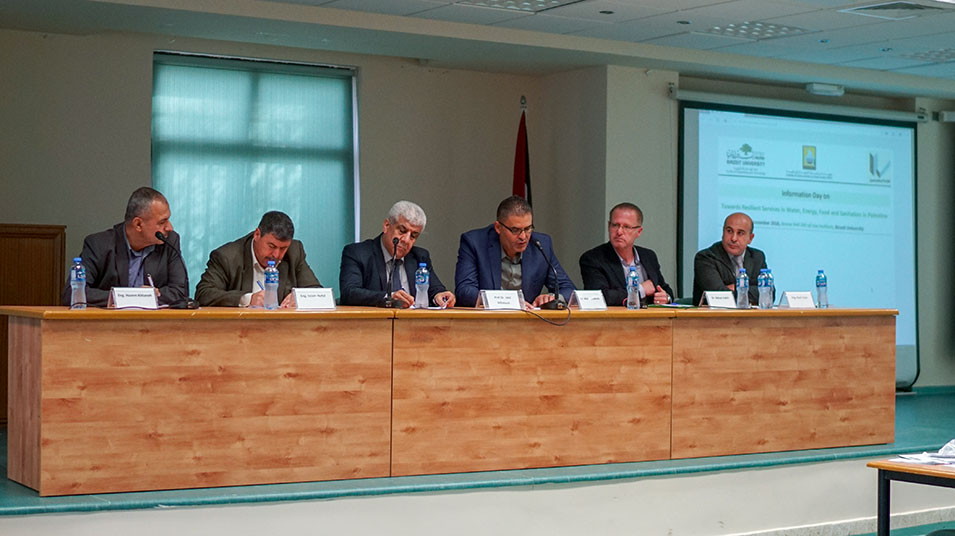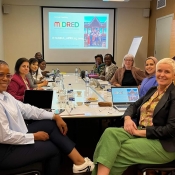Information day looks for ways to improve water, food, and energy security
Birzeit University’s Institute of Environmental and Water Studies and the Faculty of Engineering and Technology, in cooperation with the Palestinian Engineers Association-Jerusalem Center {PEA-JC), organized an information day entitled “Towards Resilient Services in Water, Energy, Food and Sanitation in Palestine” on November 22, 2018.
The information day gathered academics, policy makers, practicing engineers, experts, and managers involved in the water and sanitation, environment, energy, and agriculture sectors in Palestine, who exchanged their knowledge and experiences to come up with innovative solutions to the current and future challenges in the sectors discussed.
Dean of the Faculty of Engineering and Technology Wasel Ghanem opened the information day by highlighting Birzeit University’s awareness of and response to the fourth industrial revolution by implementing interactive learning and integrating interdisciplinary programs into its academic plan. The university, according to Ghanem, believes in the importance of science and technology in achieving economic growth. That is why the Faculty of Engineering and Technology supports students’ innovative projects in meeting the demands of the 21st century.
Head of the Engineers’ Association-Jerusalem Center Jalal Al Dabeek noted that the association is very interested in working with government and non-governmental bodies to support and provide inputs for the development of projects concerned with advancing Palestine’s infrastructure, especially in water, energy, and sanitation. Al Dabeek stressed the importance of integrating practical research that is compatible with the needs of industrial sector as a teaching method.
Hazem Kittaneh from the Palestinian Water Authority said that in order to achieve water security, there is a need to secure easy access to water resources, in addition to the importance of improving the efficiency of water management and use, which are both very difficult under the control and intervention of the Israeli occupation. Kittaneh explained the authority’s work to achieve water security through legal and institutional reform projects, the building of water tanks and networks, and the integration of green practices to achieve water sustainability.
Basel Yaseen, the general director of renewable energies at the Palestinian Energy and Natural Resources Authority, talked about the authority’s commitment to a better use of renewable energy resources, as they are more sustainable and environmentally-friendly. These projects, according to Yaseen, will help in reducing the dependency on the Israeli authorities’ supply of energy, especially electricity, and therefore achieve energy security.
Issam Nofal, the director of the water department at the Ministry of Agriculture noted that water, food, and energy are all important factors to enhance the well-being of Palestinians. Nofal explained that the Ministry of Agriculture aims to ensure household food security and increased sustainable agricultural productivity, as well as develop and promote projects for sustainable development and management of natural resources in Palestine.
Adnan Judeh, the Director of the Environmental Radiation Department at the Environment Quality Authority explained how important it is for academic, governmental, and non-governmental institutions to join efforts to come up with new ideas, policies, and projects that are able to achieve food, water, and energy security in Palestine.
During the information day, participants assessed the impacts of political, socio-economic, environmental, and climate change on resilient water supply, energy, and food security sectors in Palestine. Plenary speeches and roundtable discussions explored the challenges of and solutions for water, energy, food, and sanitation services in Palestine, and explored ways to foster cooperation between governmental agencies, academia, engineers, NGOs, and the private sector.








